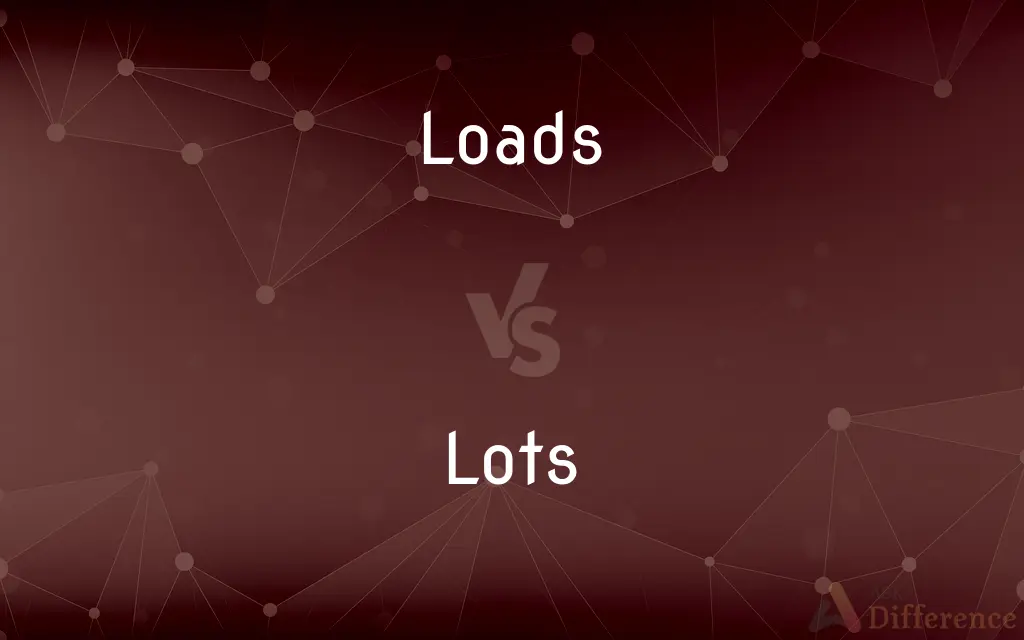Loads vs. Lots — What's the Difference?
Edited by Tayyaba Rehman — By Fiza Rafique — Updated on April 9, 2024
Loads refers to large quantities or amounts, often implying a burden or something to be carried, while lots implies a great number or extent, used more generally without the connotation of weight.

Difference Between Loads and Lots
Table of Contents
ADVERTISEMENT
Key Differences
Loads often conveys a sense of physical or metaphorical weight, suggesting that the quantity is not only large but also potentially burdensome or challenging to manage. In contrast, lots implies a large number or amount of something but lacks the connotation of weight, making it more versatile in describing quantities in various contexts without implying difficulty or burden.
In everyday language, "loads" is frequently used to describe substantial amounts of tangible items, such as "loads of laundry" or "loads of groceries," which can physically be heavy or cumbersome. On the other hand, "lots" is used more broadly and can refer to both tangible and intangible quantities, such as "lots of time" or "lots of ideas," where the emphasis is on the abundance rather than the challenge of handling the quantity.
When talking about responsibilities or tasks, "loads" can imply that the volume of work is overwhelming or taxing, as in "loads of work." Whereas "lots" used in a similar context, like "lots of assignments," may simply indicate a high number without necessarily suggesting that the tasks are burdensome.
In informal speech, both terms are often used interchangeably to express a large quantity or degree of something. However, "loads" might carry a slight nuance of exaggeration, emphasizing the effort or capacity required to deal with the quantity, while "lots" remains neutral or casual, merely indicating abundance.
While "loads" can evoke a sense of empathy or commiseration when used to describe someone's difficulties, such as "she's got loads on her plate," "lots" tends to be more neutral and factual, less likely to elicit a specific emotional response regarding the weight of the circumstances.
ADVERTISEMENT
Comparison Chart
Connotation
Implies weight or burden
Implies abundance without weight
Use
Large quantities, often with a sense of being overwhelming
Large numbers or amounts, more neutral
Context
More specific to tangible items or responsibilities
Broad, applicable to tangible and intangible quantities
Emotional Tone
Can suggest effort or difficulty
Generally neutral or casual, without suggesting difficulty
Examples
"Loads of laundry," "loads of work"
"Lots of time," "lots of ideas," "lots of friends"
Compare with Definitions
Loads
A large number or amount, often with implications of being heavy or burdensome.
She had loads of boxes to move to the new house.
Lots
More neutral in tone, without necessarily suggesting an overwhelming amount.
We found lots of interesting books at the library.
Loads
Can refer to a great deal of emotional or physical effort.
He's carrying loads of responsibility at work.
Lots
Indicates abundance or a great extent of something without implying difficulty.
There's lots of cake left from the party.
Loads
Used to express the idea of abundance with a hint of being overwhelmed.
We have loads of homework this weekend.
Lots
A large amount or number, used in a wide range of contexts.
She has lots of friends in the city.
Loads
Often related to tasks or items that require handling or management.
There are loads of dishes to be washed.
Lots
Can be used with tangible and intangible quantities alike.
He has lots of ideas for the new project.
Loads
Sometimes used to emphasize the scale of something in a conversational context.
You missed loads of fun at the party!
Lots
Commonly used in informal speech to denote a general sense of plenty.
There are lots of reasons we should go early.
Loads
A weight or mass that is supported
The load on an arch.
Lots
A large extent, amount, or number
Is in a lot of trouble.
Has lots of friends.
Loads
The overall force to which a structure is subjected in supporting a weight or mass or in resisting externally applied forces.
Lots
Used adverbially to mean "to a great degree or extent" or "frequently"
Felt a lot better.
Ran lots faster.
Doesn't go out a whole lot.
Has seen her lots lately.
Loads
Something that is carried, as by a vehicle, person, or animal
A load of firewood.
Lots
A number of associated people or things
Placating an angry lot of tenants.
Kids who were a noisy lot.
Loads
The quantity that is or can be carried at one time.
Lots
Miscellaneous articles sold as one unit
A lot of stamps sold at an auction.
Loads
The share of work allocated to or required of a person, machine, group, or organization.
Lots
An individual of a particular kind or type
That dog is a contented lot.
Loads
The demand for services or performance made on a machine or system.
Lots
A piece of land having specific boundaries, especially one constituting a part of a city, town, or block.
Loads
The amount of material that can be inserted into a device or machine at one time
The washing machine has a full load.
Lots
A piece of land used for a given purpose
A parking lot.
Loads
A single charge of ammunition for a firearm.
Lots
The complete grounds of a film studio.
Loads
Vulgar Slang An ejaculation of semen.
Lots
The outdoor area of a film studio.
Loads
A mental weight or burden
Good news took a load off my mind.
Lots
An object used in making a determination or choice at random
Casting lots to see who will go first.
Loads
A responsibility regarded as oppressive.
Lots
The use of objects in making a determination or choice at random
Chosen by lot.
Loads
The external mechanical resistance against which a machine acts.
Lots
The determination or choice so made
The lot fell on the widow's only son.
Loads
The power output of a generator or power plant.
Lots
One's fortune in life; one's fate
It was her lot to struggle for years in obscurity.
Loads
A device or the resistance of a device to which power is delivered.
Lots
To apportion by lots; allot.
Loads
A fee that a mutual fund charges to an investor when the investor purchases or redeems shares in the fund.
Lots
To divide (land) into lots.
Loads
Often loads(Informal) A great number or amount
There were loads of people at the parade.
Lots
To divide (goods) into lots for sale.
Loads
Derogatory Slang A heavy or overweight person.
Lots
Plural of lot
The men cast lots.
They purchased all of the adjacent lots.
Loads
Genetic load.
Lots
(colloquial) A lot; a great deal; tons; loads.
Lots of the ways you can help are really easy.
Don't worry, my family has lots of money.
She made lots of new friends.
Loads
To put (something) into or onto a structure or conveyance
Loading grain onto a train.
Lots
(colloquial) A great deal; very much.
I feel lots better about it now that we've talked.
I care lots about the humane treatment of animals.
Loads
To put something into or onto (a structure or conveyance)
Loaded the tanker with crude oil.
Lots
A large number or amount;
Made lots of new friends
She amassed a mountain of newspapers
Loads
To provide or fill nearly to overflowing; heap
Loaded the table with food.
Loads
To give worries or difficulties to; weigh down; burden
Was loaded with responsibility.
Loads
To insert (a necessary material) into a device
Loaded rounds into the rifle.
Loads
To insert a necessary material into
Loaded the printer with paper.
Loads
(Games) To make (dice) heavier on one side by adding weight.
Loads
To charge with additional meanings, implications, or emotional import
Loaded the question to trick the witness.
Loads
To raise the power demand in (an electrical circuit), as by adding resistance.
Loads
To increase (an insurance premium or mutual fund share price) by adding expenses or sale costs.
Loads
(Baseball) To have or put runners on (first, second, and third base).
Loads
(Computers) To transfer (data) from a storage device into a computer's memory.
Loads
To receive a load
Container ships can load rapidly.
Loads
To charge a firearm with ammunition.
Loads
To put or place a load into or onto a structure, device, or conveyance.
Loads
(Computers) To be transferred from a storage device into a computer's memory.
Loads
Lots, much, plenty, a great deal.
Loads
Plural of load
Loads
A large quantity; a lot; as, loads of fun.
Loads
A large number or amount;
Made lots of new friends
She amassed a mountain of newspapers
Common Curiosities
Is "loads" more negative than "lots"?
"Loads" can have a slightly more negative connotation due to its implication of weight or burden, unlike "lots."
Can "lots" imply a large quantity without being overwhelming?
Yes, "lots" suggests a large amount without the connotation of being difficult to manage.
Is "loads" specific to physical items?
Primarily, but it can also metaphorically refer to non-physical burdens, such as responsibilities.
Can "loads" and "lots" be used interchangeably?
While often used interchangeably in casual conversation, "loads" implies a heavier or more burdensome quantity than "lots."
Which is more formal, "loads" or "lots"?
Both are considered informal, but "lots" is more versatile and slightly less colloquial than "loads."
Is there a difference in emotional impact between "loads" and "lots"?
"Loads" might evoke empathy or concern due to its connotation of weight, whereas "lots" is more likely to be received neutrally.
Can "lots" refer to opportunities or possibilities?
Absolutely, "lots" can indicate a multitude of opportunities or possibilities without implying any burden.
How do "loads" and "lots" reflect speaker intention?
The choice between them can subtly indicate the speaker's perception of the quantity as either a challenge ("loads") or simply an observation of abundance ("lots").
Are there contexts where "loads" is more appropriate than "lots"?
When wanting to emphasize the effort involved in managing a quantity, "loads" is more suitable.
Is it appropriate to use "lots" in academic writing?
In academic writing, more precise quantifiers or descriptions are preferred over informal terms like "lots."
What does saying "lots" reveal about the speaker's attitude?
It suggests a neutral or positive attitude towards the quantity, without highlighting any associated difficulty.
Why might someone choose to use "loads" over "lots" in storytelling?
To convey a sense of burden or challenge faced by characters, adding depth to their experiences and struggles.
Do "loads" and "lots" have different origins?
Yes, "loads" originates from the idea of a heavy burden, while "lots" comes from the concept of a portion or share.
Can "loads" be used positively?
Yes, it can be used to emphasize a positive abundance, though it often hints at effort or capacity required.
Can the use of "lots" or "loads" affect the tone of a conversation?
Yes, "loads" might introduce a tone of seriousness or complaint, while "lots" keeps the conversation light and neutral.
Share Your Discovery

Previous Comparison
Megaohm vs. Megohm
Next Comparison
Ern vs. UrnAuthor Spotlight
Written by
Fiza RafiqueFiza Rafique is a skilled content writer at AskDifference.com, where she meticulously refines and enhances written pieces. Drawing from her vast editorial expertise, Fiza ensures clarity, accuracy, and precision in every article. Passionate about language, she continually seeks to elevate the quality of content for readers worldwide.
Edited by
Tayyaba RehmanTayyaba Rehman is a distinguished writer, currently serving as a primary contributor to askdifference.com. As a researcher in semantics and etymology, Tayyaba's passion for the complexity of languages and their distinctions has found a perfect home on the platform. Tayyaba delves into the intricacies of language, distinguishing between commonly confused words and phrases, thereby providing clarity for readers worldwide.
















































